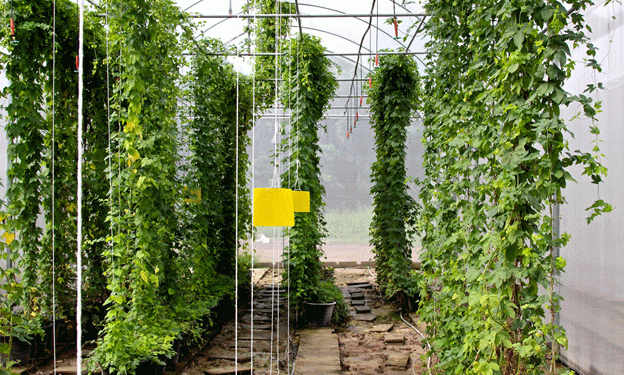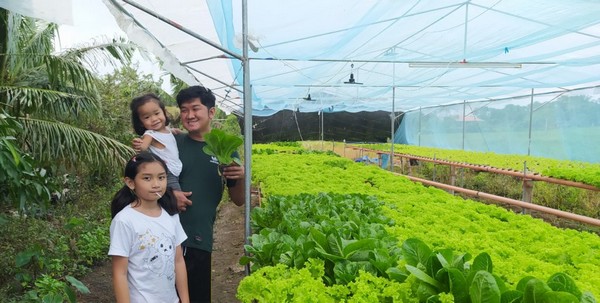South Africa’s hop industry, essential for the production of beer, is at a crossroads. Historically concentrated in the Southern Cape, where the climate has been favorable for hop cultivation, the industry is now facing serious threats due to rising temperatures linked to climate change. To address these challenges, innovative entrepreneurs like Khaya Maloney are turning to hydroponics as a way to sustain and even enhance hop production.
Maloney, an entrepreneur and computer engineer, launched Afrileaf, a hydroponic hop farm located on a rooftop in the heart of Johannesburg. His venture aims to provide high-quality hops for craft brewers, as well as to explore its uses in cosmetics and culinary applications. “Once I did my research, I realized many people are really into green agriculture. That gave me the idea to focus on hops,” Maloney shared. Inspired by American growers specializing in sustainable hop farming, Afrileaf was born, bringing the concept of a four-season hop farm to South Africa.
Hops are the cornerstone of beer production, providing the bitterness, flavor, and aroma that define various beer styles. The African beer market relies heavily on hops, but rising temperatures in the Southern Cape pose a significant risk to traditional hop farming. Studies show that hops are highly sensitive to temperature fluctuations. Even a small increase of 2 to 5 degrees Celsius can alter the plant’s growth and development, a process known as phenology. This could dramatically impact the quality of hops, leading to reduced yields and poor-quality crops.
Dr. Olaniyi Amos Fawole from the University of Horticultural Sciences in Johannesburg explained, “Hops are a very delicate plant. A small change in temperature can have a profound effect on its development, which is why climate change is such a concern for the industry.” To mitigate these risks, Afrileaf’s hydroponic system offers a controlled environment where temperature, humidity, and nutrient levels are carefully regulated. This allows Maloney to produce high-quality hops all year round, regardless of outdoor climatic conditions.
Hydroponic farming, the method of growing plants in nutrient-rich water without soil, offers several advantages over traditional soil-based agriculture. First, it uses up to 90% less water, a crucial benefit in water-scarce regions like South Africa. Second, the controlled environment eliminates the threat of pests and diseases, reducing the need for chemical pesticides. Finally, hydroponics enables vertical farming, which maximizes space in urban areas and ensures higher yields per square meter compared to traditional farms.
Beyond brewing, Afrileaf is also exploring the potential of hops in other industries. Hops have been used for medicinal purposes for centuries, known for their calming and sleep-inducing properties. Recently, they have found their way into the cosmetics industry, where they are used for their anti-inflammatory and antioxidant benefits. “We supply hops for brewers, but we’re also seeing increasing interest from the cosmetics and culinary industries,” said Maloney. Local sourcing of hops also appeals to businesses aiming to reduce their carbon footprint by using domestically grown ingredients instead of importing them.
As the global demand for craft beer continues to rise, Afrileaf is positioned to meet the needs of the expanding market. However, for the hop industry to thrive and diversify further, Maloney believes government support is crucial. “The hop industry will grow when the government creates policies to support new farmers,” Maloney stated. Research and development are also essential to improve plant quality and resilience. While hydroponics offers a solution to the challenges posed by climate change, ongoing investment in research is needed to optimize growing conditions and ensure long-term sustainability.
According to data from the Food and Agriculture Organization (FAO), climate-smart agriculture, including hydroponics, is gaining traction worldwide as an effective tool for adapting to and mitigating the effects of climate change. This method not only secures food and agricultural production in extreme climates but also opens up new opportunities for urban farming and year-round crop production.
As climate change continues to threaten traditional agriculture, hydroponic farming emerges as a promising solution for crops like hops, which are highly sensitive to environmental conditions. Afrileaf’s innovative approach demonstrates that with the right technology and entrepreneurial spirit, South Africa can maintain its hop production and even expand its applications beyond brewing. Government support, along with investments in research and development, will be essential in sustaining this growth and ensuring the long-term viability of the hop industry.










